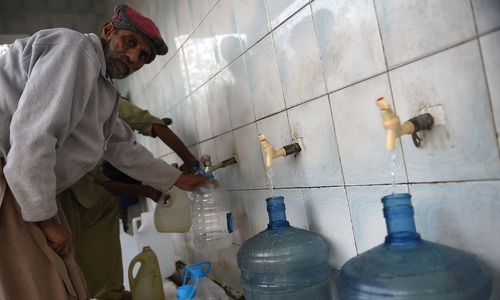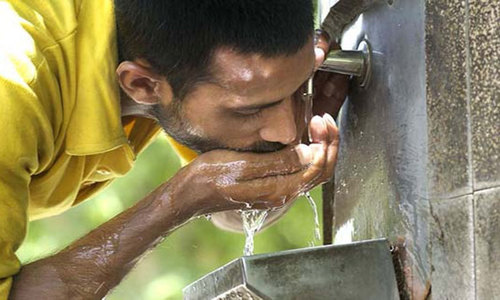The month of March is turning out to be a cruel, yearly reminder of Pakistan’s water woes. Every March, even planned drawdown of dams, which the Indus River System Authority (Irsa) delays to the last extent by absorbing early shortages and staggering them during the season, gets completed; both major lakes hit dead level, leaving the country on run of the rivers’ supplies. This year, on March 18, when this piece was written, all three reservoirs jointly held 754,000 acre feet of water (Mangla 441,000, Tarbela 200,000 and Chashma 112,000 acre feet).
What adds to the national water stress is the fact that Irsa makes its seasonal calculations by the third week of March and comes up with water availability (rather non-availability) figures for the Kharif (April-Sept) season, which are defined more by shortages than abundance.
In the last 27 years (post-Water Accord period), the country has never met its entire Kharif demand: out of its 74.683maf requisite (under Para 2 of the accord), the country, on an average, has had 64.573maf, or a loss of 10.11maf that works out to an average shortage of 14 per cent. The seasonal variations are more worrisome: varying between -4 and a whopping -28pc. For 10 out of the 27 years, the shortages were above the average of -14pc. For eight years, they were 10pc or more. This year, as omens tell us, the country may break previous record, at least for the early Kharif season — unless abnormal and unexpected rains lash the country or steep rise in temperatures help melt glaciers or snow.
Once this poverty of the resource takes hold, both on the ground and in policymakers’ psyche, provincial scramble for water starts and hurried mismanagement worsens the worst. Accusations of theft and misreporting start flying from, and to, every direction, triggering a temporary water civil war among federating units. Invariably, Sindh accuses Punjab of stealing water and the latter points out missing water at the Sindh barrages. Balochistan accuses Sindh of passing on undue water stress to it and Sindh deflects the blame onto Punjab, saying that the upper riparian is to be blamed; so, three out of the four water claimants in the national pool get at loggerheads. It is not only early Kharif that causes fissures among the federating units, but later in the season when the monsoon and flood cycle start, the blame-game begins all over again.
Interestingly, it is not just the federating units that blame each other every Kharif, but Irsa (the federal regulator) accuses both Punjab and Sindh of stealing and misreporting as well. In three years (2016-19), it produced five reports that blamed the federating units for “misreporting and theft” as they “controlled” barrages and “manipulated” the data. The reports were sent to the federal government for action as well. Citing dichotomy between water available at the rim stations and canal withdrawal, the Irsa, in its reports, says around 16maf water goes missing each year.
It says that around 105maf water still flows in the system — the same quantity, which was available immediately after the accord. The canal withdrawal, as reported by the provinces, has dropped to 100maf, however. Where has 5maf of water gone? So have the flows downstream Kotri barrage, which historically averaged at 38maf, now dropped to 27maf? This 11maf water is missing here, which the Irsa maintains is being stolen from the system by the provinces.
According to spokesman for Irsa Khalid Rana, another factor adds complexity to the issue of water governance in the country. Although the same amount of water that was available in the post-Water Accord period is still there, its availability pattern is getting alternated due to climatic effects. It now remains cooler in the northern areas for much longer periods, which delays glacier and snow melt. Mercury these days is an example; it is cooler in the northern areas (with some parts still receiving snow) and almost constant temperature (around 30 degrees Celsius) in the plains for the last two to three weeks.
Once this cycle gets deeper, the dam filling days (historically hovering around 70) would get reduced, forcing managers to alter filling criteria. Can dams, especially Tarbela, cope with quick filling without pressure on its safety? This question would haunt policymakers in the next few years, he fears, adding “water governance is getting complicated, with pressure coming from all sides — both man-made and natural”.
Citing Irsa data, Rabia Sultan, a founding member of the Punjab Water Council, says that although March comes as a stark reminder of water distress, the situation is not any better for the rest of the year. Since 1993, the Rabi shortages are even higher at an average of -16pc. They hit an unbelievable -48pc in 2001-02; for eight out of the 27 years, they were more than 40pc. Even after the Mangla dam was raised to store over 2maf more water, which recouped 24pc of (38pc storage lost to silting of dams) capacity, the Rabi shortages were still 32pc in 2017-18 and 30pc next year.
“March in fact sets the trend, which then permeates through the year. In a nutshell, out of 12 months, the country has six high-deficiency months and rest just below normal. The situation will remain so unless Pakistan increases its storage capacity to deal with these six high shortages months.”
Published in Dawn, March 19th, 2021















































